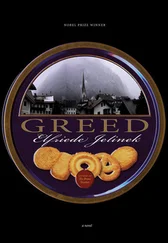The sun sets, as it so often has done before, and Maria Andergast sings a duet with somebody I've forgotten, it couldn't have been Attila (Paul) Horbiger, could it? Peter Alexander sings a duet with Caterina Valente. Caterina sings a grotesque duet with Silvio Francesco, who is her own brother in real life, and pulls a face so that you can tell what high spirits she's in again today, such high spirits she can scarcely believe it herself. Lolita sings about a sailor and then does a duet with Vico, who likewise pulls faces so you think any moment the rest of his face is going to fall off, leaving only his teeth. The sailor abandons his dreams and the travel agencies boost their turnover in dreams. Vico rolls his eyes so you can see the whites, he's so happy, it's as if he were having an epileptic fit. If he goes on like that, they'll have to wedge a piece of wood between his lips and secure his tongue so that the talented Swiss singer doesn't choke. Otherwise his great future will be prematurely ended. Young bambis pole timidly across the screen, their long baby legs are so sweet, and presently they're scooped up from the ground and squeezed to a corseted bust so that their tongues pop out and their eyes roll. There isn't a starlet alive who can leave a bambi, which is a creature of the forest, on the ground where it is. Because they love it very very much indeed, this little fawn standing merrily by the fringe of the forest. The person picking it up is Waltraud Haas, Haasi, playing a blonde orphan who finds a good master in the priest of Kirchfeld. She is on the brink of being led astray but she runs away. The young salesgirls in the cinema squeeze their thighs together, weeping, so that the groping lathe operator or welder hands are jammed in tight with no room to manoeuvre. The hands want to get in, but all they get into is the bag of popcorn, a recent American invention which is overflowing with sheer abundance because there's a lot in the bag. The oft-practised boob-grope is nipped in the bud this time round because Conny, that cute little Marianne, has an exam to take at the conservatoire. Watching her, they sweat the sweat of leisure, which is pleasanter than the sweat of labour because it is sweated on a voluntary basis. She (Conny) has been trained to play serious classical music, true, but she prefers singing lively hit songs in a night club, where the director of the conservatoire tracks her down, but he has to laugh (heartily) at his very best pupil's transgression, she will soon be marrying a rich young man, even though at present she's still putting up resistance. At times, Conny groans out loud in this film, which isn't normally in character since she is of a carefree, cheerful nature, as Youth should be (the serious side of life makes its appearance quite soon enough), but lovesickness even gives her a hard time, it's hard to believe. But you know her worries will soon be over. Bibi Johns and Peter Alexander sing a duet of love, jazz and fantasy, they want a house by the sea so blue with a garden I'll be true to you. Ernsti, alas, comes home later and later, he wants a VH, he'd be better off getting married. In the end the four lasses from the Wachau are married off too. Not to Wachau lads, though, they'll be marrying city boys, let's hope the latter don't think in too materialistic terms (as people in the city often do), they ought to have picked a country boy who knows what values are and where you get them: Nature.
The envelope-addressing Hansmother butts in on the pot-pourri of her son's thoughts because she would like to improve his mental ability. She fails in the attempt, because all he listens to is rock'n'roll, which his friend Rainer frequently explains to him. Rainer will have a Campari and soda before him at such times and he will explain how modern music achieves its effects, Hans would rather let it go ahead and achieve its effects but Rainer's blather prevents this. Rainer has already lied, too, claiming to know a musician personally, which wasn't true. He doesn't know any musicians at all and is only bragging. This Rainer often supplies interminable overall views of subjects that are of no interest to anyone. And now Mother also supplies an overall view so that her son will be far-sighted, all in vain. Today as always it is a history lesson, Hans has had as much as he can take of that. Mother opens a book and reads in a dispassionate tone: On Friday 6. 10. 1950 the schilling was devalued, from 14 to 21.60 to the dollar. Allegedly this showed that the wage and price agreement of that year, which supposedly compensated fully for the increase in prices, was a con intended to deceive the people. (So what. All that matters is having the schillings in your pocket at Cafe Hawelka or the Picasso Bar.) Mummy reports that many social democratic union officials left the old party they loved so dearly because they couldn't stand the united front that had been formed with the reactionary volkspartei against the struggling workers. The emotional burden was too great. If you're a socialist and a socialist union secretary calls you a bastard, you have to leave the party. Mother goes on and on like this in her boring way, working as if she were being paid for it, which she is. She needs the money. She would rather do something more interesting but she is too old. Because the future belongs to the young workers and so does the present. And in the past, too, young people were permitted to bite the dust first. Youth is never passed over. It is always up front. When the old has become unbearable you have to start something new. Hans finds his old life unbearable and wants to start a new one. If your marriage has become unbearable and you can't take it any more, you have to get out, thinks Hans, who saw this in an American film where there were problems. Mostly he prefers German films, though, not because he wants to support the homegrown product but because they are not so full of problems. With James Dean everything goes so fast and often you don't get what's going on, you've hardly understood one problem but the next has reared its head. It's better to break things off, a short sharp cut that may well be very painful, than to endure everlasting torment. Hans thinks of Anna and her cunt and that the old must give way to the new, usually something better is already waiting, otherwise you could just as well stick with the old, which in fact you chuck for the sake of what's new and better. What counts is choosing the right moment and the right place to make the break. You have to follow your heart, which in any case always tells you what you already want. Hans's heart says Sophie out loud and jumps, and four-metres-plus further on it lands in the sand, well done! Hans has private problems, his mother has public problems which are uninteresting because they produce no apparent profit and only waste time. Work wastes time too, to be exact: the time it takes to do it, but then you have money to take home, and with that money you get on the trail of quality, if you have a nose for it. Hans is beginning to understand his feelings for Sophie. In films this often takes a long time but then it can suddenly go very quickly and acquire powerful momentum.
Sophie alias Vera Tschechowa alias Karin Baal are so cool and classy, they commit trivial and serious crimes, walking the wet streets, for the sake of a man, which is the wrong way. When Hans says: Stop, choose another way, not the path of dishonesty, they consent and on the next day they are already off with him to do something better with their lives than committing crimes. Hans has made them do this because he loves them. A valiant social worker lends his assistance, which in this case Hans will not even need because he has enough willpower for several people. From time to time someone will be shot and will lie dead on the cobbles. You have to avoid things reaching the point where a gun is drawn, you have to see about changing course before it's reached. Crime is not essential to happiness and a career. In fact it rules them out, totally. To forge a career, you have to inspire trust. Hans has taken this first step, because Sophie trusts him. He will take the second shortly. At times Rainer boasts about a pistol that supposedly belongs to his father but which he can borrow whenever he wants, which is bragging too, they all know Rainer's talk. But then, his father does occasionally let him drive the car though he doesn't have a licence, that much is true, Hans has seen it for himself. This may come to a bad end, to be exact: the death or injury or imprisonment of Rainer.
Читать дальше












